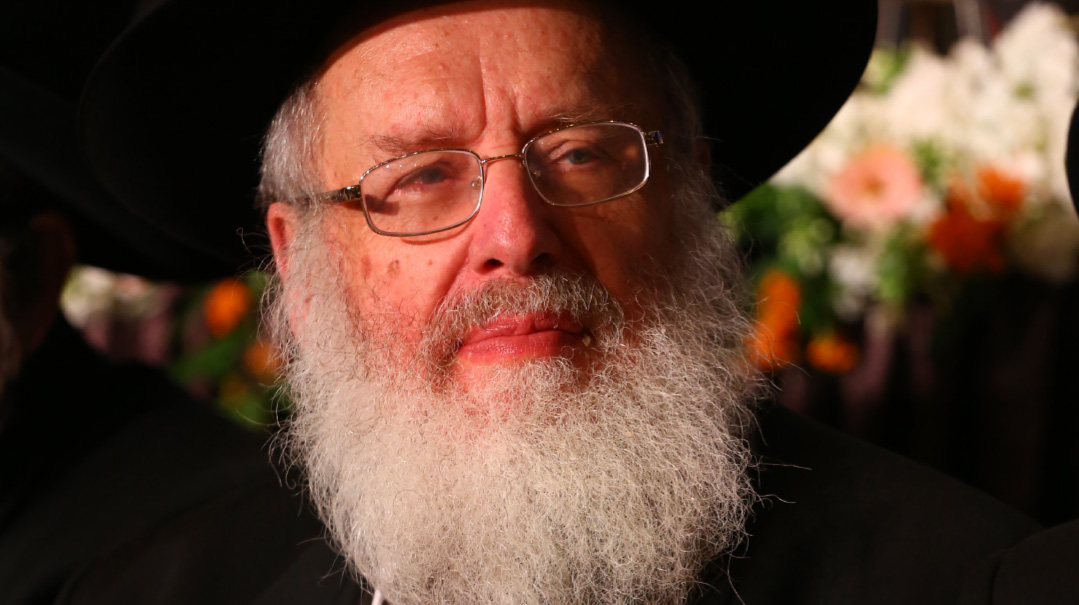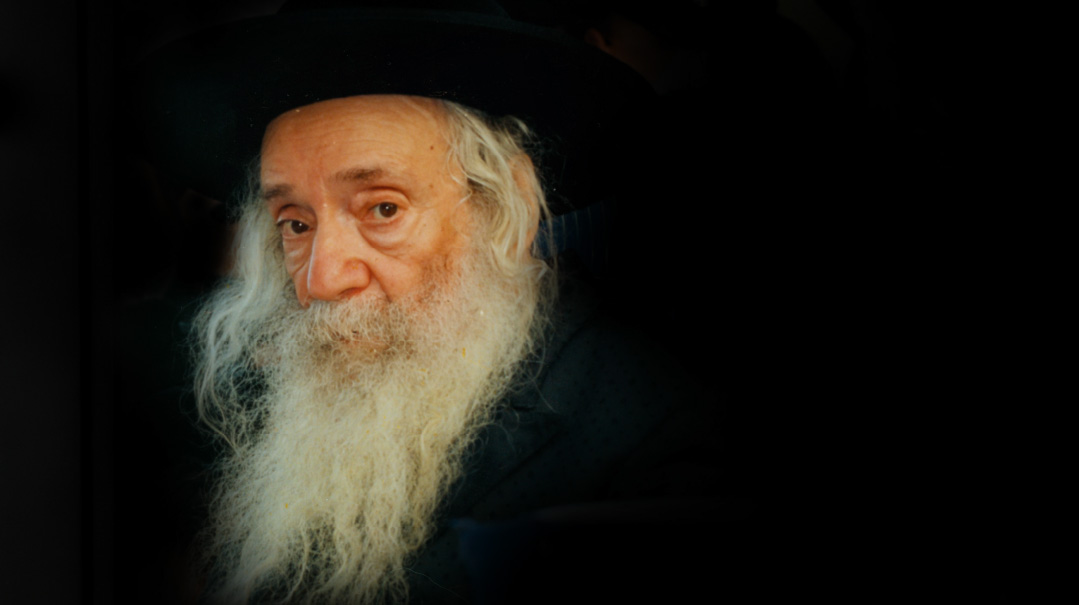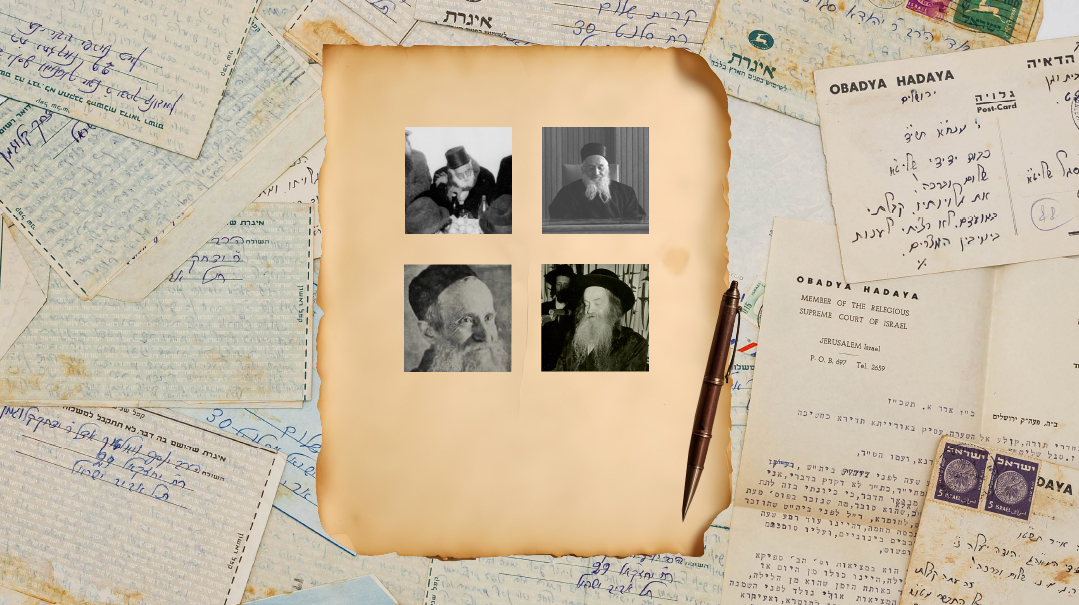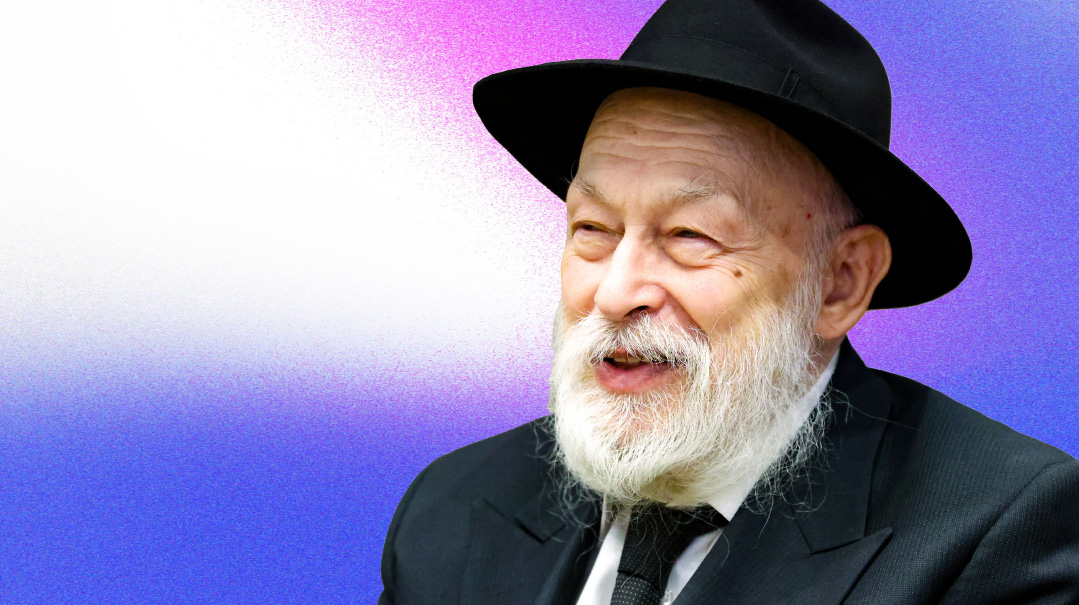Safeguard the Queen

Rav Yitzchak Zilberstein’s sure-fire method of bringing salvation to the Jews of Eretz Yisrael
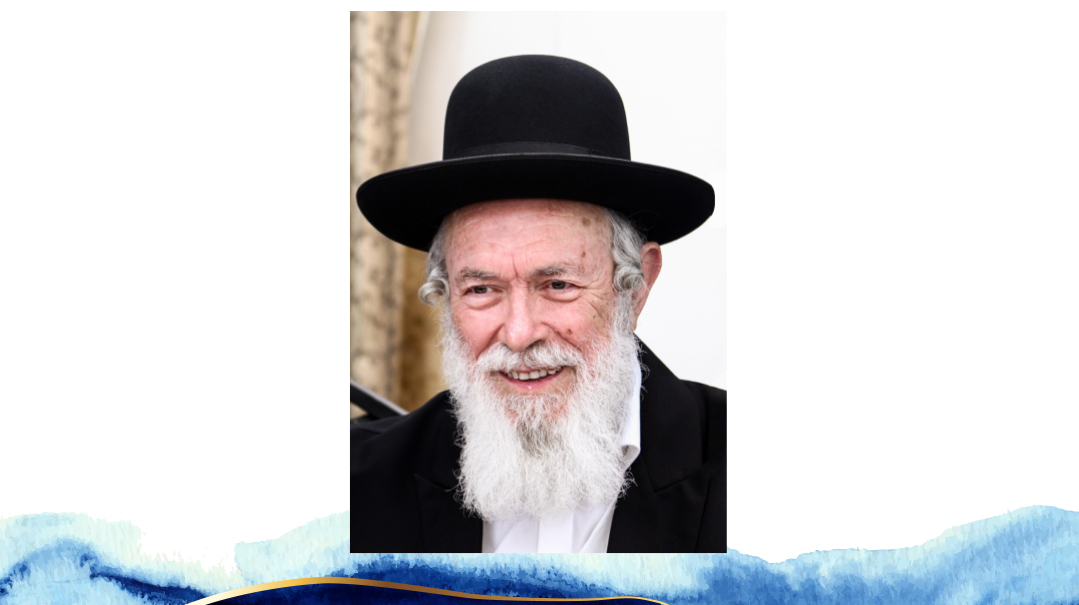
Photos: Mattis Goldberg
IN the aftermath of last week’s Hamas massacre, Jews across the world were consumed by shock, then horror, then grief — and then resolve. Resolve to exert every earthly effort to rid the world of the murderous terror group, along with the resolve to elevate ourselves so we can be worthy of the Divine aid that is so crucial to our safety and security amid so much hate.
Rav Yitzchak Zilberstein holds a seat of honor at the mizrach vant of Jewish leadership. A famed posek, son-in-law of Rav Elyashiv, rav of Bnei Brak’s Ramat Elchanan neighborhood and of the Mayanei Hayeshuah Medical Center, and confidant of some of the greatest gedolim of the era, he demands uncompromising fealty to Torah and halachah while managing to connect with Jews of every stripe and type.
In an effort to seek out practical ways to merit the Divine protection we so desperately need, we consulted with Rav Zilberstein. In response, he spoke of air raid sirens and salvation, queens and commanders, parenting and partnerships. Most of all, he sounded a clarion call: Safeguard the Shabbos and Hashem will keep you safe in return.
What kind of avodas Hashem should chareidi Jews in chutz l’Aretz focus on during these tense times?
I’ll tell you what I told the residents of Eretz Yisrael, something that’s also relevant to the residents of chutz l’Aretz. If they improve this one thing, it will bring brachah and shemirah to all the Jewish people in the entire world.
Mere weeks ago, on Yom Kippur, the holiest day for the Jewish people, we read (Yeshayahu 58:13,14): “Im tashiv miShabbas raglecha… az tisanag al Hashem v’hirkavticha al bamosei aretz….”
Do you hear, Rabbosai, what the message is? Shabbos! You want HaKadosh Baruch Hu to help you? You want to live? Do you want to have a happy life? Do you know what the segulah is? One thing: Shabbos!
The language of the pasuk describes a causative link between observing Shabbos and living in peace in Eretz Yisrael. The implication is that if you don’t keep Shabbos, things will not be good. Why is that the case? The Dubno Maggid explains with a parable.
There was a king who had a minister. Sometimes this minister obeyed the king, and other times, he didn’t obey him so well. But the minister retained the king’s favor because he had a very clever wife whose advice the king greatly valued.
Once, the woman came to the palace, and the king saw that she was beaten and bloody. The king asked what happened to her, and she refused to answer. Again and again he pressed her for an explanation, but she would not respond. “I’m guessing that you were beaten,” the king said. Silence.
“It’s clear to me,” the king said, “that you were beaten by your husband, and therefore he will be hanged at once. I should have killed him long ago — he has long lost my favor. I only kept him alive because of his wife. Now that he is mistreating his wife, then what use do I have for him?”
This parable of the Dubno Maggid explains how the existence of the Jewish people is intertwined with its observance of Shabbos. Shabbos sometimes cries, it pains me to say. Our Shabbos is the queen, Shabbos Malkesa, Lecha Dodi likras kallah. And the King — HaKadosh Baruch Hu — sees Shabbos crying and trampled, and therefore Am Yisrael loses whatever merit they have.
I want to tell you something I saw with my own eyes. When I was a little boy living in Jerusalem, I spent time in the presence of the holy Rebbe, Rav Shlomo of Zvhil, ztz”l. I was once there when people approached him with frightening news: “Rebbe,” they said, “Hitler, yemach shemo, has dispatched his top general, Commander Rommel, to Eretz Yisrael to do to the Jewish people what he did in Europe, to slaughter them. He has signed a deal with the mufti, who will permit his troops entry.”
“Why didn’t you tell me this news before Kiddush?” the Zvhiller Rebbe asked the gabbai.
“What difference would it make?” the gabbai, Reb Elya Roth, asked.
The Rebbe replied, “When I say ‘Vayechulu’ then I am a partner with HaKadosh Baruch Hu in His world. I can tell Him, ‘Partner, I don’t allow this destruction to take place.’ But now that I have finished Kiddush…[I no longer have that opportunity].”
Kiddush, the Rebbe was saying, gives me a stake in Hashem’s kavod in this world; I am spreading His Name and His honor. Thus I can plead that He change His plans and save His children.
It’s like a king who owns oil wells or gold mines, but no one knows of him or his great assets. Now imagine there is a publicist who spreads the word of this king, telling the world of his massive holdings and power. That publicist possesses a stake, as it were, in the king’s influence, and as such he can share his own opinions and requests with the king.
Back then, as everyone quaked with fear at the oncoming German invasion, the Rebbe did not lose hope. He went to immerse in the mikveh and then came back and said, “Tell everyone that he [Hitler] will not make it into Eretz Yisrael!”
And in fact, the end of the story is well-known. Hitler’s troops arrived in El Alamein, and the desert terrain left them very thirsty. To their delight, they found a newly constructed water pipeline bringing in water from the Alexandria water works — it had been built by Britain’s Eighth Army Corps of Engineers for the British soldiers who would be fighting there.
The Germans filled up their canteens and drank and drank, only to find their thirst increasing. It turns out that the Engineer Corps had decided to test the pipe using saltwater — why waste precious freshwater on a test run? — and that saltwater is what the German troops drank.
Thirsty almost to the point of delirium, they cursed Hitler and his whole entourage, and were greatly weakened. Ultimately, they fell during the battle of El Alamein and did not enter Eretz Yisrael.
Like the Zvhiller Rebbe said, when one recites Vayechulu, he becomes a partner, as it were, with Hashem — and the partnership is sealed over Shabbos. Shabbos is the witness that HaKadosh Baruch Hu created Heaven and Earth.
It is brought down in seforim that someone approached the Chofetz Chaim pleading, “Rebbi, my wife is in labor, and it’s not going well. She is in great danger and no one seems able to help her.”
The Chofetz Chaim looked at him and said, “Only one thing can help — bring me someone who has done something, made some sort of sacrifice, for the sake of Shabbos, and then I can save her.”
The desperate man found someone who had made the decision to close his store on Shabbos. “Will you give the merit of your shemiras Shabbos to this woman?” the Chofetz Chaim asked. The man agreed.
“Go home,” the Chofetz Chaim told the husband of the laboring woman. “Your wife has given birth. All is well.”
Rabbosai, HaKadosh Baruch Hu has given us a gift, and that is Shabbos. Now I am appealing to the Jewish people — are you seeking some merit, some way to bring salvation to the Jews in Eretz Yisrael? The answer is Shabbos! I am confident that in the merit of Shabbos, Am Yisrael will see a yeshuah. Safeguard Shabbos Hamalkah, and Hashem will keep us safe.
What is the best way to show nesiah b’ol, feeling our fellow Jews’ pain, at this time? Is it something tangible and external, or is it more of an internal type of avodah (or both)?
If Jews in chutz l’Aretz will strengthen their Shabbos observance, learn two hilchos Shabbos a day, and reach out to other Jews who have not tasted the holiness of Shabbos, this in itself demonstrates their nesiah b’ol with the residents of Eretz Yisrael. Because this is the channel that will bring great blessing to the world, as Shabbos is the source of all brachah.
But it is also possible — and imperative! — to strengthen our bein adam lachaveiro, our interpersonal relationships. I remember during the Six Day War in 1967, I was in a bomb shelter in Jerusalem. The situation was very dire; there were shells falling from every which way. There was an agunah with us; her husband had absconded and left her alone and neglected.
As the shells whistled over and around us, she stood up and proclaimed loudly: “Ribbono shel Olam, I completely and wholeheartedly forgive my husband for what he did to me. I forgive him for all the pain and humiliation that he caused me, and in exchange, please forgive us, Father in Heaven, for our sins, and save us.”
Rav Chaim Shmuelevitz ztz”l, stood up and said, “In the merit of this woman, the yeshuah for all of Am Yisrael will come.”
He then added something awesome: that this one agunah’s act of shviras hamiddos, the way she overpowered her natural inclination to hold on to bitterness and resentment, could save more Jews than the tefillos of the entire yeshivah. That is the special power of shviras hamiddos.
The lesson for us is that anyone who is maavir on his middos, who overcomes his natural inclinations, will be forgiven for all his sins (Rosh Hashanah 17a). This is something that people in the Diaspora can work on, and in its merit they can bring a yeshuah to the entire Jewish people.
Many people fall into depression when seeing the scenes of the slaughter and our helplessness in the face of the horror. How can they lift their spirits?
It’s prudent not to look at any horrific images, and it’s best not to read all the details printed in the media. [Not just because they are dispiriting, but also] because this is a waste of time. Instead of reading media reports, it’s advisable to daven and to say Tehillim with kavanah, and to increase one’s Torah learning. The Torah is the best cure for all the ailments of the body and soul.
How can we guide our children during such horrific events?
Many mechanchim asked me for advice during this time. The horrific events of last week are public knowledge, and many parents are asking how to discuss and share with the children what happened and what is happening, and what might, chalilah, happen. Not every child can handle this kind of information.
Another question: Some parents feel their children’s tefillos will be stronger if they come from a place of emotion. And we do need the tefillos of the children, because only they can help us. But it can be harmful for a child to hear all the terrible details and to experience paralyzing fear. What is the right way for mothers and fathers to act?
My answer is that our task is to encourage and give chizuk to our children. You can tell them in my name that I guarantee that if they work to improve their Shabbos observance, they have nothing to fear. Just emphasize that one point: Shabbos saves us.
Tell him, “My child, it’s an eis tzarah l’Yaakov, Shabbos has been violated, and if we keep Shabbos now, and you learn two hilchos Shabbos every day, HaKadosh Baruch Hu has promised, if Am Yisrael will keep two Shabbosos, then they will immediately merit the Geulah!” (Shabbos 118b).
Should a family that traveled abroad return to Eretz Yisrael at this time or stay there? Is Eretz Yisrael currently considered a safe place for Jews? Should Jews look for some other, alternate refuge until the arrival of Mashiach?
Of course one can come back to Eretz Yisrael, the holiest and most protected place in the whole world. Every minute that one is in Eretz Yisrael, he is fulfilling the mitzvah of yishuv Eretz Yisrael. The Ponevezher Rav ztz”l, etched on the wall of his yeshivah the pasuk in Ovadiah (1:17): “U’veHar Tzion tihiyeh f’leitah vehayah kodesh,” meaning that Yerushalayim is a place of refuge.
We know how much my brother-in-law Rav Chaim Kanievsky ztz”l, would urge and encourage the residents of chutz l’Aretz to come and settle here, because Mashiach is literally at the door. This is especially true for the talmidei yeshivah who come to Eretz Yisrael to learn Torah, since Torah protects us and saves us.
I once heard that a Jew approached Rav Chaim Shmuelevitz ztz”l, after the Six Day War. “Rebbi should know,” he said, “that even though I was abroad the entire duration of the war, I davened intensely for the Yidden of Eretz Yisrael, and thus shared their distress.”
To which Rav Chaim responded, “But you missed out on the sirens!”
In other words, the air raid sirens are like the thunder of which the Gemara says (Berachos 59a): “Lo nivra re’amim…Thunder was only created in order to straighten out the crookedness of the heart, as it is written, Veha’Elokim asah sheyir’u milefanav, Hashem made it so they will fear Him.”
The same is true now: The air raid sirens are meant to arouse us to do teshuvah. After all, “Can it be that the shofar will be sounded in the city and the nation will not fear?” This is an opportunity for teshuvah — and it is this opportunity that is lost to the Yid who’s in America for the duration of the war.
I ask again of all my dear friends in Eretz Yisrael and abroad, to set time to study each day two halachos in Hilchos Shabbos. One can do so from the Dirshu edition of Mishnah Berurah, or from other seforim that have hilchos Shabbos. If we strengthen our observance of Shabbos, we will merit the protection of Hashem.
There is an awe-inspiring point written in the sefer, Kad Hakemach: “Shabbos is called menuchah, as it says (Shemos 20:11) ‘Vayanach bayom hashevi’i.’ Likewise, Eretz Yisrael is called menuchah, as it says (Devarim 12:9) ‘…el hamenuchah v’el hanachalah.’ We see that Shabbos and Eretz Yisrael are interlinked. The pasuk promises that if Am Yisrael will preserve the menuchah of Shabbos, Hashem will guard them in the Land, and if they do not keep Shabbos, then He will decree that the land be destroyed. So we learn that the galus is the punishment for Shabbos desecration and Geulah depends on our keeping Shabbos.”
May we all strengthen our Shabbos observance, and of course, continue to daven and plead for all the injured and captives — that Hashem send them all a refuah, and release them from darkness to light, from bondage to redemption, and may we quickly merit the yeshuas olamim, amen v’amen.
(Originally featured in Mishpacha, Issue 982)
Oops! We could not locate your form.


